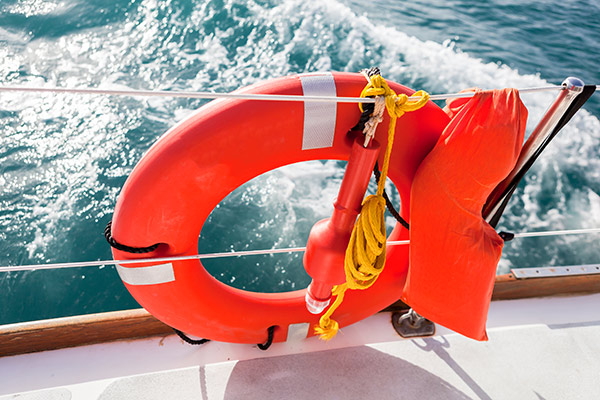No one wants to get into a boating accident. And to be sure, taking the right precautions can minimize the risk of getting into one. Unfortunately, even for boaters who do everything right—such as carefully monitoring weather conditions and navigational aids, maintaining safe cruising speeds, and keeping a lookout for hazards—mishaps can happen.
How often? The most recent U.S. Coast Guard data shows that nearly 4,500 recreational boat accidents were reported in 2016; the number has been rising since 2013. Accidents run the gamut from minor scrapes to real disasters. But no matter the incident’s severity, says Charles Fort, Associate Editor at BoatU.S. Magazine, boaters who have an accident should follow the same procedure.
Here are the steps he recommends.
1. Make Sure Your Passengers Are Safe
Your first priorities should be making sure no one has fallen overboard and taking stock of any injuries—including your own. You should also be sure everyone aboard is wearing a life jacket (here’s how to choose the right life jacket), especially if the boat appears to have been damaged. If possible, drop anchor; that will let you focus on the needs of your crew and make sure you don’t drift into more trouble.
2. Call For Help
If you have cell reception, call 911; if you’re using a VHF radio, make a distress call on channel 16. Either one of these actions will allow the nearest emergency service providers—the Coast Guard, local marine police or fire department—to mobilize and come to your aid. Radio calls have an added advantage: They’ll be heard by other boaters who may be nearby and are able to assist you.
3. Gather Information
If the accident involves another boat, take down the contact and insurance information of the boat’s operator, as well as the boat’s make, model and registration number. Note the time and place that the accident occurred; if possible, take photos of both boats, the location, and any damages incurred in the accident. If there were any eyewitnesses to the accident, try to get their contact information, too. Even if you didn’t call emergency services, you must file an accident report with state or federal law-enforcement agencies if someone was injured or if accident-related damages total more than $2,000.
4. Notify Your Insurance Company
As soon as you and your crew are safely ashore, inform your insurance company of the accident. Provide as many details as possible and send in any photos you’ve taken, as well as a copy of any police reports that were filed. Even when the damage appears to be minor, be sure to follow up with an inspection and, if necessary, repairs.
Two more things to know before you set sail: You can help protect your vessel with boat insurance from GEICO and add towing coverage to give you peace of mind.
Read more: The Complete Guide To Boat Maintenance
